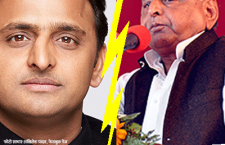[Part 1 of a series exploring the legend of Dadua, in the context of the 2017 UP election]
“Dadua? He used to hang around here a lot. We’ve met him so many times. He never ever troubled anybody.”
“I’ll tell you about Dadua. He was a monster. He threated the entire village, he was into money extortion. And when we refused to pay up, he caught hold of three people and burnt them alive right before our eyes.”
“What do you want to hear about Dadua? You’ll only hear what you want to hear, right? So, I have nothing to say, I can only tell you what the law records say.”
“All lies. All he ever did was help the poor. He even got our daughters married, what more can you ask for?”
Dadua makes for quintessential 80’s Bollywood storytelling, the very stuff of Reshma & Shera-kind of dacoit movies. And very much like a fillum, stories about his life comprise events and episodes nothing short of extraordinary. Morally culpable, horrifying stories of inhuman cruelty co-exist, quite comfortably, with gently narrated banter about his big, ever-so-big heart, a generosity of spirit hitherto unprecedented.
And given that very few can ever actually claim to having seen him, he remains akin to an unfolding, ever-thickening plot device in Bundelkhand’s dusty terrain, a complicated personality few can fathom in any holistic manner. He was shot dead in 2007 in an encounter by a special task force that was appointed to do exactly that. We know this, but what is a mere fact when juxtaposed against the deep-seated, all-pervasive belief that thinks he, like Elvis, will one day, come back? They say we live in a post-truth world ever since Donald Trump got the most powerful job on the planet, but here in Bundelkhand, post-truth, or beyond-truth, or wherefore-truth is the reality. It always has been. And howsoever enigmatic the cult of Dadua may seem from afar, this altered reality is no mystery to the inhabitants of this region.
Dadua’s origins as DaduaDakait go back some 30 years; even though the forests and villages of eastern Bundelkhand are known for its dacoits and daytime loots and plunder, Dadua is generally considered as the guy who aimed high and went big-time, transforming the scene forever. Dacoity can boast of game-changers too, after all.
Channelling a Robin Hood persona, Dadua was known to help the poor – giving them money, food, help, and executing that ultimate feat of pure generosity: sponsoring ‘a daughter’s marriage’. In a land stricken with patriarchy, where girls are a burden who must be given away at the lowest bargain, this is considered the highest form of service and magnanimity. For someone burdened with this task, one that the family saves up for their entire lifetime, Dadua is no less than a god.
Befitting then that there is a temple in his name. Dadua ka mandir, it’s called locally, and you’ll find it in the village of Kabraha located in Fatehpur district of Uttar Pradesh, complete with all that is de rigueur of a temple – bells, agarbattis, pandits, even a recently “sthaapit ki gayi” idol of the man himself – a little plumper than we last saw him to be. “For so many people, this would be the first time they set eyes on him. Not many have actually seen Dadua,” Rannkumar Sharma informs us.
It’s probably why we could consider our editor, Meera Jataw, lucky – she’s come across him, saakshaat so to speak, not once, not twice, but three times!The first time around was in 1996, in her pre-Khabar Lahariya days when she was working in a government programme for women’s education and empowerment and was en route to Ranipur Gidurha village in the Manikpur district for a meeting. It had been a particularly wet monsoon that year and their vehicle had got stuck in the marshy soil. A few men soon arrived, they seemed drunk and they were all in masks, and they started throwing their weight about. They announced themselves as belonging to Dadua’s gang, and sent ripples of fear through Meera and her colleagues who were literally stranded in the middle of nowhere. Meera somehow gathered the courage to speak with them in a stern manner, arguments followed and one of the masked men raised his voice saying, “Do you know who you are talking to?” Before things could heat up, the driver apparently intervened and told the assembled men all about the work Meera and her colleagues were doing. On hearing about how they worked with the poor and helped them with education, one of the men immediately asked the rest to stop bothering “these good people”. He then personally helped Meera and the rest to get the jeep out of the mud and sent them off, with a farewell imbued with goodwill, assuring them safety through these lands for the rest of their lives.
This man, yes, was Dadua. Although, like all things Dadua, the prefix ‘allegedly’ goes without saying.
Like the time he officiated a shaadi, bringing to task the boy’s family who were dowry-hungry, even as the cops staked out the premises hoping to catch the celebrity fugitive. Or the time hordes of cops and specialists were sent into the forests, certain that Dadua had been spotted and how they returned empty-handed each time, because Dadua would somehow always get away.
His real name was Shivkumar Patel and he has at least 400-odd crimes registered against him in both Uttar Pradesh and Madhya Pradesh. And like any notorious game-changing influencer worth his salt, Daddu has had a close relationship with the political bigwigs here. For generations now, political parties have eyed his stronghold in a much desired vote bank: the poor, the oppressed, the marginalized of Bundelkhand. To begin with, Dadua had affiliations with the Bahujan Samaj Party – seats in parliament, funds, impunity, the usual perks. The party did well in the region and was brought into power multiple times due to Dadua’s clout, and it is one of those well-known-undocumented facts of the land that those who had refused to vote for ‘the elephant’, during the 1996-97 elections, had been killed, along with their families by Dadua. When the might of the BSP began to wane, Dadua switched allegiance to the Samajwadi Party. His son, Veer Singh, has a seat in the state legislative assembly in Chitrakoot, which he contested as a SP member, and has also been given a ticket for the 2017 elections.
Veer Singh himself claims to have never seen his father. But he believes in the legend as much as the aam Bundelkhandi.
Dadua is dead. Long live Dadua.

